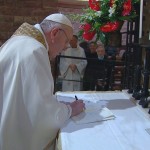Letter for Christmas 2020
Dear confreres and all the members of the Dehonian Family,
There in Nazareth for Mary and Joseph, everything transpired without any particular shock. As the days went by, the time came for them to join their lives, as was the custom among the people of their town. But an unforeseen event altered everything: the God of promises approached them as no one had ever imagined. Matthew and Luke give a good account of what happened there. They always remind us. Luke gives more details about Mary; Matthew, for his part, about Joseph. Perhaps they did so because neither of the two evangelists wanted to have an exclusive story. Both preferred to share it, because they knew that that Good News gave, and continues to give, to everyone.
Luke brings us closer to what Mary experienced when she was approached by the angel of God. The greeting she received startled her, but she did not try to escape it. She listened attentively, thinking carefully about what she just heard. Aware of her smallness, she sought to understand. To achieve this, she found no better way than humble and sincere dialogue. Only then did she decide. She accepted the call to make space in herself for the announced Son. At that precise moment, Mary became an oblation: her womb and her world were opened without reservation to Life.
And Joseph? Matthew presents him, literally, as “her man.” However, aware of the state of his betrothed, but oblivious to God’s ways, he chose to “let her go.” But his decision plunged him into an inner conflict. The “just” man was caught between the ruthless justice he knew and what he really wanted. He himself seemed unhappy with what he just decided. In fact, some of the words the evangelist uses to identify what Joseph intended to do are dangerously close to those used to describe the actions of Herod, when he acts “in secret” against the newborn King of the Jews (cf. Mt 2,7) and Pilate, “letting go” of the criminal and condemning the truly righteous one, the same child king whom Herod so feared (cf. Mt 27,11.19.26).
Joseph does not stop thinking about what was happening, as if he wanted to solve everything differently. Precisely, “while he was considering these things”, the unexpected happened: God approached him. He did it at the moment when the human condition opens without caution to the unpredictability of dreams. Through the angel, God confirmed Joseph’s belonging to his people. He reminded him that he is the son of David, not of the severe Law, nor of fear. And additionally in the midst of that nation God asks him to renew his bond with Mary, the woman docile to the Spirit.
From there, like a friend who shares his innermost self, God entrusts to Joseph what he loves most: the life of his Son and the salvation of his people. But could this man appreciate so much shared love? Oh yes! The closeness, intimacy and trust that God showed him were enough, not only to dispel his fears, but to rekindle his hope, his love and his dignity. That dream completely renewed him from top to bottom. Therefore, rising without hesitation he assumed the task that God left in his hands. He reacted – now finally with a yes – like a truly righteous man.
Welcoming Mary, the Son in her womb and his own people, Joseph anticipated the teaching that Jesus will later share with his disciples: those who recognize, without prejudice and with haste, the unpredictable human face of God are truly righteous, because “each time you did it for one of the least of my brothers, you did it for me” (Mt 25,40). The solution to Joseph’s uncertainties was not, therefore, in disengaging. On the contrary, he entered into encounters with the others, with the most fragile and, above all, allowing God’s dreams to recreate life to the utmost extent possible.
Together, with the Word in their hearts, Mary and Joseph thus gave a home to God’s mercy and faithfulness. With the Word before their eyes, they contemplated it and pondered it with the poor and with foreigners. With the Word in their arms, they joined the fugitives and refugees. With the Word in their hand they became pilgrims with their people. With the Word treasured in their hearts, they lived discipleship beyond measure. Such dedication did not escape the attention of Fr. Dehon. With them he learned this way of trusting and grateful abandonment to the will of the Father. There he discovered the school of a total life of love and surrender:
“Our thoughts must constantly direct us towards them. For the inner life, they are our models absolutely. We should study them primarily in prayer. We must probe their feelings, their thoughts, their desires, their joys, their sorrows, their wills and constantly adapt our thoughts, our words, our actions, our whole life to them.” [1]
Between the resounding yes of Mary and the enthusiastic silence of Joseph, Jesus found the sure guide to the heart of the Father and that of men and women of all times. What an opportune time for us to contemplate this family more closely! How good the company that they themselves offer us so that we do not become sterile in despair or blocked in indifference! Are they not the ones who explain to us like nobody else our very reason for being in the Church and in society? If we could do a webinar with this holy Family in the next few days, and we asked them to tell us briefly and in Dehonian terms what they retained of everything that happened to them, it would not be strange that, with a warm look and a smile overflowing with tenderness, they would tell us something like this in chorus:
We understood reparation as a welcome to the Spirit (cf. 1Thes 4,8) as a response to Christ’s love for us, a communion in His love for the Father and as a collaboration in His work of redemption in the midst of the world.[2]
May this Christmas be restorative for our communities, our families and our world. We need it. May these be days of encounter with eyes that long to see us and hearts that welcome us. We desire it. May the celebration of Emmanuel help us to live gratefully, not the tomorrow that does not come, but the today of what is possible. We want it. That “while we consider these things”, we do not stop making room, especially when it is night, for the dreams that God shares with us. Many things can, and should be, different. We long for it!
To everyone, Merry Christmas!
Fraternally, in Corde Iesu,
Fr. Carlos Luis Súarez Codorniú, scj Superior General and his Council
_____
[1] NTO 9140002/67 : « Notre pensée doit se porter sans cesse vers eux. Pour la vie intérieure, ils sont absolument nos modèles. Nous devons les étudier dans l’oraison principalement. Nous devons sonder leurs sentiments, leurs pensées, leurs désirs, leurs joies, leurs tristesses, leurs volontés et y conformer sans cesse nos pensées, nos paroles, nos actions, notre vie toute entière ».
[2] Cf. Cst 23.




